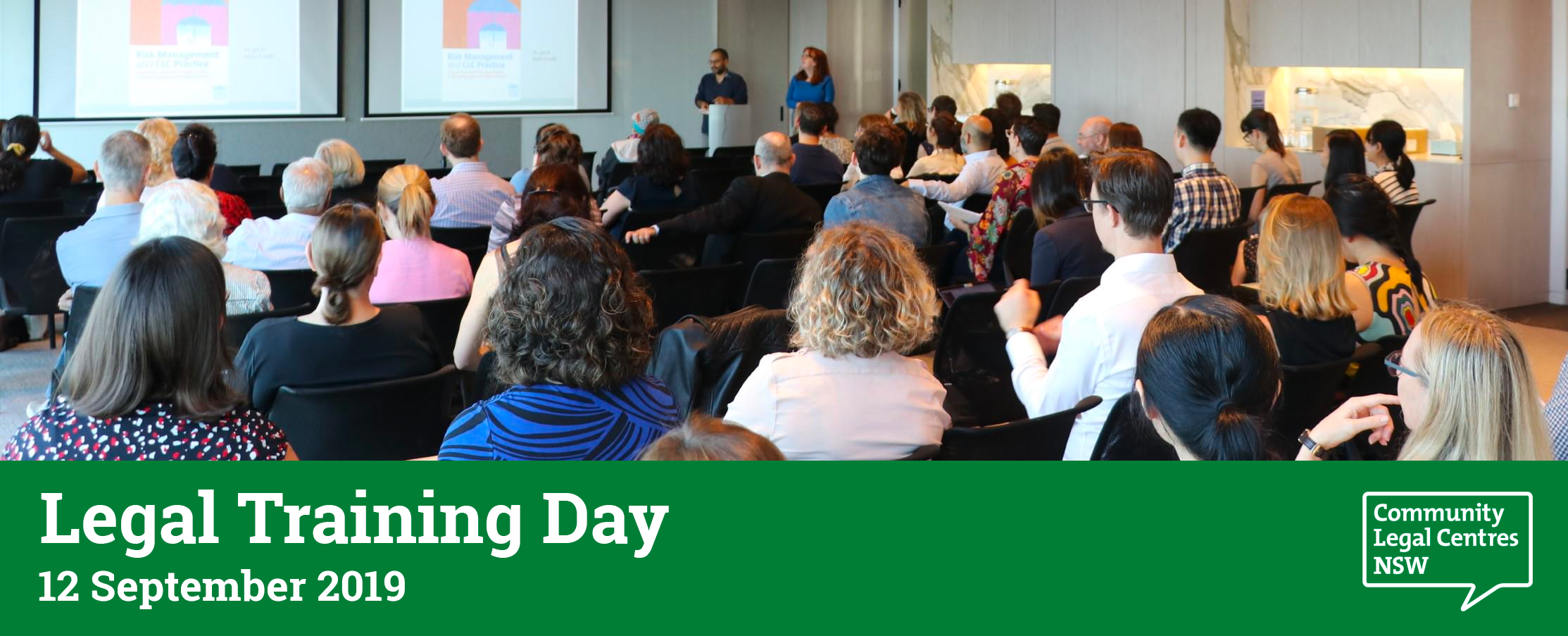
The Legal Training Day is open to staff from Community Legal Centre NSW member centres only as an opportunity for staff to access CPD points*. Please ensure your registration clearly indicates the centre you are associated with to secure your place at the training.
Places are limited and registration is required. Register here
When:
Thursday, 12 September, 8.30am–4.00pm
Venue:
Gilbert and Tobin
Level 35, Tower Two, International Towers Sydney,
200 Barangaroo Avenue, Barangaroo
Program
Risk Management in Community Legal Centres
Hilary Kincaid
Principal Solicitor, Inner City Legal Centre
This session will cover practice issues in relation to the Community Legal Centre Risk Management Guide, identifying Legal Service Delivery Risk, effective risk management processes, and effective legal service delivery for community legal centres
Possible CPD*: Practice Management
Conflict of Interest Policy
Aideen McCarrigle
Manager, Client Eligibility Unit, Legal Aid NSW
Sally McAtee
Senior Solicitor, Inhouse Council Unit Legal Aid NSW
Legal Aid NSW recently implemented a new Conflict of Interest Policy to assist in responding to client demand and providing services to appropriate clients. This presentation will provide background to the development of the policy, the effectiveness of the policy and any practice challenges in implementing the policy. Community legal centre lawyers will be able to better understand this new policy and what opportunities might result for community legal centre practice.
Possible CPD*: Substantive Law
Protecting the Rights of Migrant Workers
Associate Professor Anna Boucher
University of Sydney, Department of Government and International Relations
Umeya Chaudhuri
Research Assistant, University of Sydney School of Law and Department of Government and International Relations
How important is the nature of legal advocacy in the outcome of cases brought by migrant workers to ensure their rights? This paper presents findings from a new Migrant Worker Rights Database that develops an innovative method to trace the nature and extent of migrant worker rights abuses on the ground in Australia. By coding legal decisions on migrant worker rights violations in the areas of employment, tort, human rights, anti-discrimination, and criminal law, this paper presents a new evidence base for understanding migrant worker rights violations. It traces these violations in cases brought over a twenty-year period (1996 to 2016) to capture the nature of violations across time and jurisdiction. This paper focuses in on a question particularly relevant to community legal centres and the Fair Work Ombudsman; the role played by legal advocates in protecting the rights of migrant workers. The paper presents cross-national findings on the role of public and private legal advocates, in affecting the outcome of causes of action brought by migrant workers, when controlling for other possible variables that explain success (such as the action brought, the characteristics of the migrant and the representation enjoyed by the opposing side and the laws in place at the time). This paper holds practical applications for the way community legal centres and the Fair Work Ombudsman pursue litigation related to violations experienced by migrant workers.
Possible CPD*: Substantive Law, Advocacy
Wills and Estates
Updates from a panel of Senior Rights Service Solicitors
Possible CPD*: Substantive Law
- Pitfalls in family granny flat arrangements, an epic Supreme Court and Court of Appeal journey: Tim Tunbridge
- Family Provision Claims & Challenging a Will - what the Court considers and recent cases update: Mitch Harvey
- Enduring Powers of Attorney and Guardianship – duties and Responsibilities, and what to look out for: Melissa Chaperlin
Towards the Positive Framing of Human Rights in Australia
Professor Rosalind Croucher AM
President, Human Rights Commission
Possible CPD*: Substantive Law, Advocacy
A panel of Principal Solicitors from the community legal sector share their experience and strategies for managing issues or situations that have challenged ethical obligations and/or professional conduct. There will be an opportunity for an open discussion to further explore shared experiences.
Pip Davis
Assistant Principal Solicitor, Women’s Legal Service
Patrick O'Callaghan
Principal Solicitor, Western NSW Community Legal Centre
Natalie Ross
Principal Solicitor, Welfare Rights Centre.
Possible CPD*: Legal Ethics
Community Legal Centres NSW indicates whether a session may be appropriate to attract Continuing Professional Development (CPD) points but takes no responsibility if the content does not meet CPD requirements. Sessions are not accredited by the NSW Law Society. Community legal centre solicitors should make their own assessment of whether the session meets their CPD requirements and maintain their own records for meeting CPD requirements. Further information about CPD requirements are available on the Law Society NSW website.
